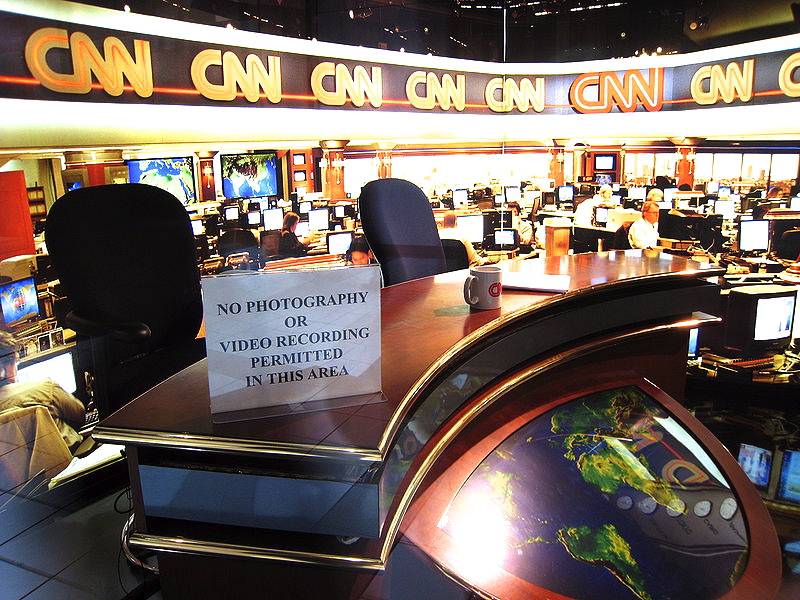
Big Media want to fool you. They hope you believe that they’re providing the most comprehensive coverage of Syria’s raging civil war. The atrocities are disgusting. Slaughtering of innocent lives is inexcusable. Yes, Big Media have been on the story. But how, and from where, have they been covering this historical event?
If you look at newspaper datelines and live television coverage, foreign correspondents are mostly reporting on the civil war from the exact places that the war crimes are not happening, like New York, London, Geneva and Washington, D.C.. As a former television journalist, I speak from experience when I assert that the scene of a disaster is the best place to truly understand an unfolding crisis. And that type of “notebook-on-the-ground-reporting” is largely not happening in Syria for two important reasons — the second one, which I'll mention in a moment, being the more infuriating and less discussed.
The first reason: Syria’s dictator Bashar al-Assad is not granting visas to foreign journalists to enter his country. Big Media are quick to use this excuse. USA Today reported on the denial of its own visa application: “Syria has barred most international journalists since the onset in 2011 of the rebel uprising unleashed by the Arab Spring. Journalists without visas have since tried — with limited success — to enter the war-torn country despite the constantly looming threats of kidnapping and ambush.”
This reaction is typical for Big Media, which only turn their eye to countries like Syria when it’s in full turmoil. Disaster strikes. Journalists apply for expedited visas. Hoards of foreign reporters descend on location and quickly leave after the crisis concludes.
Syria existed as a country long before 2011, so where were the foreign correspondents before the war started? The answer to that question is the second reason why Syria is being covered on the cheap: Big Media have slashed the number of foreign correspondents to maximize their profits.
You will never hear CNN, FOX News or The New York Times acknowledge that the lack of “notebook-on-the-ground-reporting” is due to corporate greed. And it’s hard to find an accurate, precise number of U.S. foreign correspondents because Big Media don't want you to know how much they’ve strangled the watchdogs of global democracy.
The American Journalism Review reports that, “The number of foreign correspondents employed by U.S. newspapers has decreased markedly since the last AJR census, taken in 2003. A count largely conducted in July shows that 10 newspapers and one chain employ 234 correspondents (including one vacancy) to serve as eyes and ears to global events.”
Columbia Journalism Review gives us one example: “The Los Angeles Times had 24 foreign correspondents in 2003 … a roster which fell to 13 by 2011…The Los Angeles Times has ten foreign ‘bureaus,’ and eight of them consist of just one person.”
Launching in-depth investigations and operating overseas bureaus are the two most expensive forms of generating news. Both are quickly disappearing. Employing a foreign correspondent and keeping a bureau open in a far-flung country could cost as much as $400,000 or more a year.
Foreign correspondents often put their lives between innocents and armies to expose the truth about war. According to the Committee to Protect Journalists, 50 reporters have been killed covering Syria. I expect more journalists will probably loose their lives as well. That’s why I have the utmost respect for reporters who’ve been to the frontlines of battle and risked their lives to bring us the story.
But I abhor the corporate greed that has strangled the Fourth Estate. In an effort to squeeze more money from news institutions, Big Media owners have decimated newsrooms and foreign bureaus. Reporters have been laid off en masse. In fact, the U.S. Department of Labor predicts reporting jobs will decline by eight percent over the next seven years partly because “of the consolidation of news organizations.”
To put these figures another way: the U.S. government expects the profession that is supposed to be the bedrock of our democracy — the people who try to keep governments honest, the institution that is enshrined in the U.S. Constitution — to shrink.
In order for Assad’s atrocities to be fully understood by the world, reporters must be on the ground. They write the first draft of history. Just as USA Today points out, the lack of visas hasn’t traditionally stopped foreign correspondents because “… history of war reporting is littered with talented reporters and thrill seekers who openly flout formal visa requirements. And a sizable contingent of journalists has entered (Syria), often with assistance from insurgents along the country's porous borders.”
We should demand more from Big Media. They are ethically bound to fully report on and expose war crimes. Accurate and thorough reporting has the potential to save lives by countering the propaganda from the U.S., Russia, Syria and other foreign governments involved. In times of peace and especially during war, greed should never prevail and strangle the watchdogs of global democracy.
Follow the author @zozobraio.
3 WAYS TO SHOW YOUR SUPPORT
- Log in to post comments













